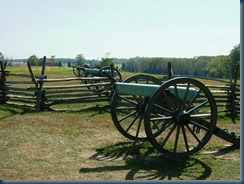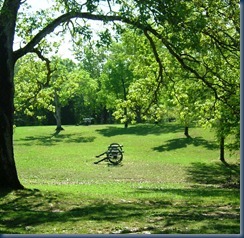 Last week, I received a phone call from Mark Coombs, a staff member at the Civil War Trust (formerly the Civil War Preservation Trust). The reason for his call was to urge me to write Senator Roy Blunt (R-MO), a member of the Senate Appropriations Committee, and ask that he work to restore funding in the full-year Continuing Resolution for Fiscal Year 2011 (FY2011 CR) for the Civil War Battlefield Preservation Program (CWBPP). The House version has already passed and eliminated all funding for this critical historical preservation program, which has saved more than 16,500 acres of battlefield lands since its enactment in 2008. I was more than happy to write Senator Blunt, pointing out to him that this was an odd time to eliminate funding for this program and that, in any campaign to reduce deficit spending, the CWBPP was not the kind of program to cut.
Last week, I received a phone call from Mark Coombs, a staff member at the Civil War Trust (formerly the Civil War Preservation Trust). The reason for his call was to urge me to write Senator Roy Blunt (R-MO), a member of the Senate Appropriations Committee, and ask that he work to restore funding in the full-year Continuing Resolution for Fiscal Year 2011 (FY2011 CR) for the Civil War Battlefield Preservation Program (CWBPP). The House version has already passed and eliminated all funding for this critical historical preservation program, which has saved more than 16,500 acres of battlefield lands since its enactment in 2008. I was more than happy to write Senator Blunt, pointing out to him that this was an odd time to eliminate funding for this program and that, in any campaign to reduce deficit spending, the CWBPP was not the kind of program to cut.
 As to the latter point, I reminded Senator Blunt that the CWBPP is a poor choice for the budget axe because it is an authorized matching grants program, and not an earmark. The grants made by the program require a 1-1 federal/non-federal match via competitive awards by the American Battlefield Protection Program, a small department within the National Park Service. Further, the CWBPP can only be used to preserve lands outside the National Park Service boundaries, and, therefore, it does not contribute to NPS maintenance costs. This program is truly the perfect example of a successful public-private partnership to promote the preservation of the most historically important Civil War battlegrounds.
As to the latter point, I reminded Senator Blunt that the CWBPP is a poor choice for the budget axe because it is an authorized matching grants program, and not an earmark. The grants made by the program require a 1-1 federal/non-federal match via competitive awards by the American Battlefield Protection Program, a small department within the National Park Service. Further, the CWBPP can only be used to preserve lands outside the National Park Service boundaries, and, therefore, it does not contribute to NPS maintenance costs. This program is truly the perfect example of a successful public-private partnership to promote the preservation of the most historically important Civil War battlegrounds.
However, an even more compelling reason to save the program is that the CWBPP is NOT a taxpayer funded program. Rather, it is already paid for under the Land and Water Conservation Fund, which is funded by using a very small percentage of oil drilling receipts.
 More importantly, I also asked the senator and his colleagues what message this action sends in the first year of the Civil War Sesquicentennial, especially to our nation’s children. Teachers and parents try to teach our country’s youth about the value of their heritage, and of the difficult and painful lessons we learned in this horrific conflict that split our nation. Now, however, our political leadership chooses to destroy the very program designed to save the ground on which the critical battles of the war were fought, on which our children’s ancestors bled and died for cause and comrade.
More importantly, I also asked the senator and his colleagues what message this action sends in the first year of the Civil War Sesquicentennial, especially to our nation’s children. Teachers and parents try to teach our country’s youth about the value of their heritage, and of the difficult and painful lessons we learned in this horrific conflict that split our nation. Now, however, our political leadership chooses to destroy the very program designed to save the ground on which the critical battles of the war were fought, on which our children’s ancestors bled and died for cause and comrade.
 I pointed out to Senator Blunt how shameful it was that, at a time when even mighty WalMart admitted that developing commercial property on battlefield lands in the Wilderness was simply the wrong thing to do, our Congress takes willful, deliberate action to support those developers who would ravage these small pieces of history, pave them over, and destroy them forever. I added that, while I realize some would argue that developers have a right to build on whatever land they choose for commercial use, I have always argued that these particular lands have already been paid for with something far more valuable than mere money. As a result, they are a part of our common heritage as Americans and to allow them to be buried underneath strip malls and suburban housing tracts is criminal. Permitting this to happen denies the sacrifice of those who fought this war and diminishes us all as a people. If we permit these fields to disappear, we allow the memories they hold to disappear as well.
I pointed out to Senator Blunt how shameful it was that, at a time when even mighty WalMart admitted that developing commercial property on battlefield lands in the Wilderness was simply the wrong thing to do, our Congress takes willful, deliberate action to support those developers who would ravage these small pieces of history, pave them over, and destroy them forever. I added that, while I realize some would argue that developers have a right to build on whatever land they choose for commercial use, I have always argued that these particular lands have already been paid for with something far more valuable than mere money. As a result, they are a part of our common heritage as Americans and to allow them to be buried underneath strip malls and suburban housing tracts is criminal. Permitting this to happen denies the sacrifice of those who fought this war and diminishes us all as a people. If we permit these fields to disappear, we allow the memories they hold to disappear as well.
 What concerns me the most, however, is that, while some might argue that that this is merely a temporary measure, one necessary in a belt-tightening budget environment, once the Congress zeros out a budget line, it may never be restored. Moreover, what is even more frightening is the potential reason behind these cuts, which have also affected other historical preservation programs. Given the lack of any logic for cutting the CWBPP, why would members of Congress cut it? The answer is clear: Commercial developers want these lands badly, and they have money to contribute to the politicians who define the budget. Without the protection offered by programs like the CWBPP, it will be much easier for them to plow them under, never to be recovered. So, it appears to me that, once again, the Congress has opted to side with those who can fill their campaign coffers, forsaking not only popular opinion, but our nation’s heritage in the process.
What concerns me the most, however, is that, while some might argue that that this is merely a temporary measure, one necessary in a belt-tightening budget environment, once the Congress zeros out a budget line, it may never be restored. Moreover, what is even more frightening is the potential reason behind these cuts, which have also affected other historical preservation programs. Given the lack of any logic for cutting the CWBPP, why would members of Congress cut it? The answer is clear: Commercial developers want these lands badly, and they have money to contribute to the politicians who define the budget. Without the protection offered by programs like the CWBPP, it will be much easier for them to plow them under, never to be recovered. So, it appears to me that, once again, the Congress has opted to side with those who can fill their campaign coffers, forsaking not only popular opinion, but our nation’s heritage in the process.
I would ask that every one of you immediately email, call, or fax the members your state’s congressional delegation and ask them to restore CWBPP funding in the FY2011 CR. Please do so quickly, as the bill will come to a vote very soon. Help save these lands now, for we may not get another chance.





